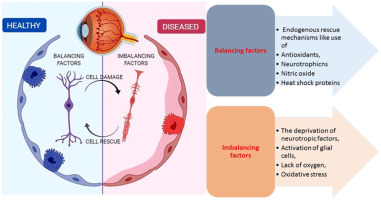Our official English website, www.x-mol.net, welcomes your
feedback! (Note: you will need to create a separate account there.)
Bio-tactics for neuroprotection of retinal ganglion cells in the treatment of glaucoma
Life Sciences ( IF 5.2 ) Pub Date : 2020-01-14 , DOI: 10.1016/j.lfs.2020.117303 Khushwant S Yadav 1 , Sushmita Sharma 1 , Vaishali Y Londhe 1
Life Sciences ( IF 5.2 ) Pub Date : 2020-01-14 , DOI: 10.1016/j.lfs.2020.117303 Khushwant S Yadav 1 , Sushmita Sharma 1 , Vaishali Y Londhe 1
Affiliation

|
Glaucoma, a neurodegenerative disorder is characterized by damage of ganglion cells of retina and also its axons. The manner of progression of disease and retinal ganglion cells death in glaucoma still remains unknown and hence many mechanisms are put forward to understand the disease. Clinical developments have suggested that in every single patient decreasing intraocular pressure (IOP) is not the solution to prevent glaucoma which suggests on the fact that there are other risk factors affecting the disease. The demand for substitute unconventional treatments gives rise to the need to understand the biologically based tactics (bio-tactics) for stopping the progression of disease. Pragmatic findings of past years have supported novelty of inventive molecules with hallmark of neuroprotection in gene therapy. On the other hand, transformation of the latest drugs to clinic has not been of much fruitful substantially for the reason that it lacked dependability while measuring in vivo retinal injury. This as a consequence thwarted the high quality healing possibility of neuroprotectants whether administered single-handedly or given complimentary with other IOP reducing agents. Advancement in research is crucial to grasp the underlying mechanisms concerned with glaucoma and apply it in clinical field to develop neuroprotective agents. In this context, the present review is to bring forth an update on up to date progress in the domain of neuroprotection of retinal ganglion cells for treating glaucoma.
中文翻译:

青光眼治疗中视网膜神经节细胞神经保护的生物策略
青光眼是一种神经退行性疾病,其特征是视网膜神经节细胞及其轴突受损。青光眼中疾病的进展方式和视网膜神经节细胞死亡仍然未知,因此提出了许多机制来了解该疾病。临床发展表明,降低每位患者的眼内压 (IOP) 并不是预防青光眼的解决方案,这表明还有其他危险因素影响该疾病。对替代非常规治疗的需求导致需要了解阻止疾病进展的基于生物学的策略(生物策略)。过去几年的实用研究结果支持了具有基因治疗神经保护标志的创新分子的新颖性。另一方面,最新药物向临床转化并没有取得实质性成果,因为其在测量体内视网膜损伤时缺乏可靠性。结果,这阻碍了神经保护剂的高质量治愈可能性,无论是单独使用还是与其他眼压降低剂一起使用。研究的进步对于掌握青光眼的潜在机制并将其应用于临床领域开发神经保护剂至关重要。在此背景下,本综述旨在提供视网膜神经节细胞神经保护治疗青光眼领域的最新进展。
更新日期:2020-01-14
中文翻译:

青光眼治疗中视网膜神经节细胞神经保护的生物策略
青光眼是一种神经退行性疾病,其特征是视网膜神经节细胞及其轴突受损。青光眼中疾病的进展方式和视网膜神经节细胞死亡仍然未知,因此提出了许多机制来了解该疾病。临床发展表明,降低每位患者的眼内压 (IOP) 并不是预防青光眼的解决方案,这表明还有其他危险因素影响该疾病。对替代非常规治疗的需求导致需要了解阻止疾病进展的基于生物学的策略(生物策略)。过去几年的实用研究结果支持了具有基因治疗神经保护标志的创新分子的新颖性。另一方面,最新药物向临床转化并没有取得实质性成果,因为其在测量体内视网膜损伤时缺乏可靠性。结果,这阻碍了神经保护剂的高质量治愈可能性,无论是单独使用还是与其他眼压降低剂一起使用。研究的进步对于掌握青光眼的潜在机制并将其应用于临床领域开发神经保护剂至关重要。在此背景下,本综述旨在提供视网膜神经节细胞神经保护治疗青光眼领域的最新进展。











































 京公网安备 11010802027423号
京公网安备 11010802027423号